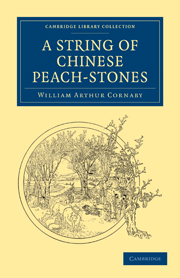Book contents
- Frontmatter
- Contents
- Note on the Illustrations
- Introduction
- CHAP. I A VILLAGE DISTRICT IN LIGHT AND SHADE
- CHAP. II RURAL SCENES AND SOUNDS
- CHAP. III THE MANDARIN IN EMBRYO
- CHAP. IV RED LETTER DAYS
- CHAP. V COMPENSATIONS
- CHAP. VI RECORDS OF AN ANCIENT CITY
- CHAP. VII CAN ANY PATHOS COME OUT OF CHINA?
- CHAP. VIII AN HISTORICAL ROMANCE
- CHAP. IX PROBLEMS DOMESTIC AND NATIONAL
- CHAP. X GODS MANY AND LORDS MANY
- CHAP. XI A TAIPING CAMP
- CHAP. XII THE LONGHAIRED HAVE COME
- CHAP. XIII SUFFERING BY DEPUTY
- CHAP. XIV AN OLD, OLD STORY IN A NEW EDITION
- CHAP. XV IMPERIAL POP-GUNS
- CHAP. XVI THE MART OF CENTRAL CHINA
- CHAP. XVII FOUR MILES OF FLAME
- CHAP. XVIII IMPERIALISTS TO THE FRONT
- CHAP. XIX ART AND ARTISTS
- CHAP. XX HOW TO BECOME A DEMIGOD
- CHAP. XXI CHANGING SCENES
- CHAP. XXII FATHER AND DAUGHTER
- CHAP. XXIII RESURRECTION
- CHAP. XXIV FOR BETTER, FOR WORSE
- Appendix
- Plate section
CHAP. IX - PROBLEMS DOMESTIC AND NATIONAL
Published online by Cambridge University Press: 05 March 2012
- Frontmatter
- Contents
- Note on the Illustrations
- Introduction
- CHAP. I A VILLAGE DISTRICT IN LIGHT AND SHADE
- CHAP. II RURAL SCENES AND SOUNDS
- CHAP. III THE MANDARIN IN EMBRYO
- CHAP. IV RED LETTER DAYS
- CHAP. V COMPENSATIONS
- CHAP. VI RECORDS OF AN ANCIENT CITY
- CHAP. VII CAN ANY PATHOS COME OUT OF CHINA?
- CHAP. VIII AN HISTORICAL ROMANCE
- CHAP. IX PROBLEMS DOMESTIC AND NATIONAL
- CHAP. X GODS MANY AND LORDS MANY
- CHAP. XI A TAIPING CAMP
- CHAP. XII THE LONGHAIRED HAVE COME
- CHAP. XIII SUFFERING BY DEPUTY
- CHAP. XIV AN OLD, OLD STORY IN A NEW EDITION
- CHAP. XV IMPERIAL POP-GUNS
- CHAP. XVI THE MART OF CENTRAL CHINA
- CHAP. XVII FOUR MILES OF FLAME
- CHAP. XVIII IMPERIALISTS TO THE FRONT
- CHAP. XIX ART AND ARTISTS
- CHAP. XX HOW TO BECOME A DEMIGOD
- CHAP. XXI CHANGING SCENES
- CHAP. XXII FATHER AND DAUGHTER
- CHAP. XXIII RESURRECTION
- CHAP. XXIV FOR BETTER, FOR WORSE
- Appendix
- Plate section
Summary
“When a tiger or wild bull escapes from his cage, whose is the fault?”
—Confucian Analects.“Speed the parting year” was the groan of many thousands in Central China as the mud - bespattered, flood-washed, malaria-breathing months dawdled to an end. The Chinese do not quite personate their years. No artist of the times drew a picture of an evil-looking, dirty old man being dragged off to the unseen by the underlings of Hades, assisted in his tardy progress by sundry kicks and coolie-pole urgings. Nor does transmigration apply to the souls of the years, else might the good old days come back again.
Yet the New Year is always, more or less, of an all-renovating deity. “Men at first are radically good,” whatever their parentage. And so are the years, affirmed by all the manifold congratulatory phrases and inscriptions. With the New Year the good old times always come back again— in theory. Every door is a door of riches, every hut a palace, every poor man a general or prime minister-elect,—until the year is a month or so old, when the all-renovating deity having fulfilled no one jot or tittle of his life-programme, is ignominiously degraded to the ranks of the commonplace.
But one event needs to be recorded of the otherwise uneventful thirtieth year of the Emperor Tao Kwang (1850), an event, however, which gave a new centre of importance to the home of Nieh Shen-seng, engrossed the attention of his scholars, and influenced as with gentle ripples the surrounding families.
- Type
- Chapter
- Information
- A String of Chinese Peach-Stones , pp. 187 - 208Publisher: Cambridge University PressPrint publication year: 2010First published in: 1895



